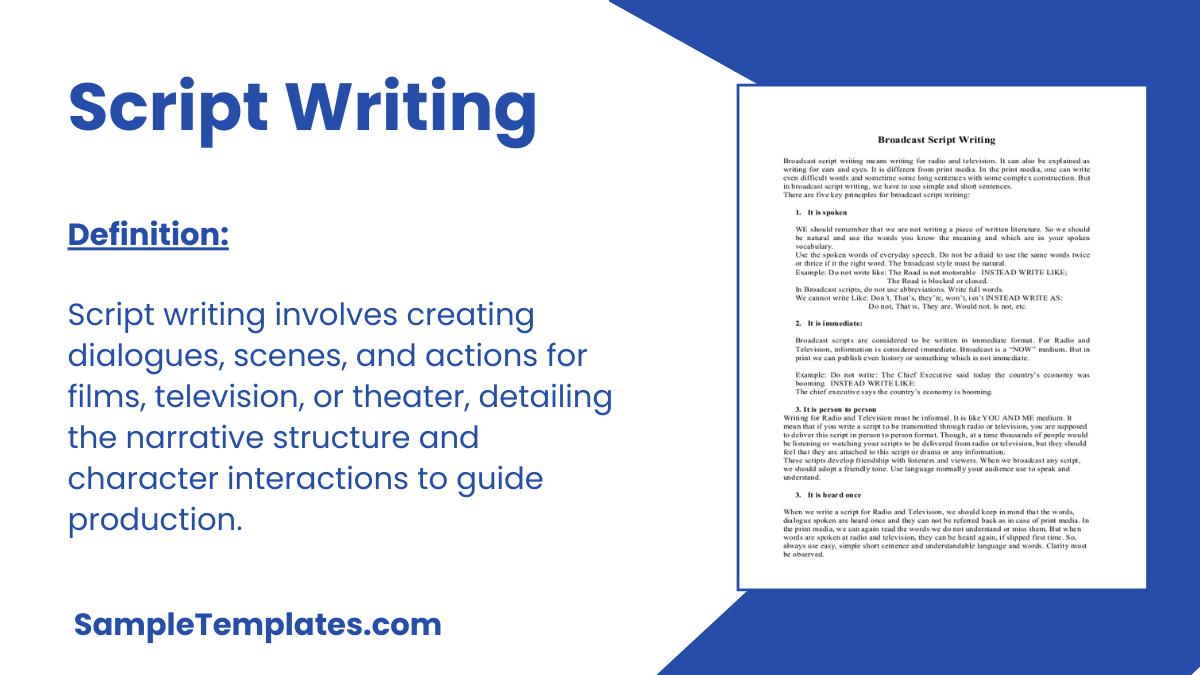Any person who wants to be a script writer needs to go through the samples to understand what is takes to be a professional script writer. The following script writing samples contain all the guidelines to help an amateur script writer to write stunning scripts for movies, radio and even class- construction, based on the given goals and guidelines. Different scripts require different approach and style of writing. The following samples explain how to create interesting characters, mind-blowing plots, gripping introduction, and long lasting conclusions. You may also see Book Writing Samples.
Radio Script Writing Sample

Details
File Format
Size: 80 KB
DownloadThis is a manual to guide someone to write a radio script to act out a drama or a story. It introduces one to the styles and parameters of writing a radio script. It states how to get started, how to choose the acts to write on, how to tell a story and mix things up effortlessly. It provides several vital tips and tricks such as how to be concise, thoughtful, visually appealing, and how to conclude to leave a lasting long impression. You can also see more on Sample Script.
Writing a Class-Constructed Script
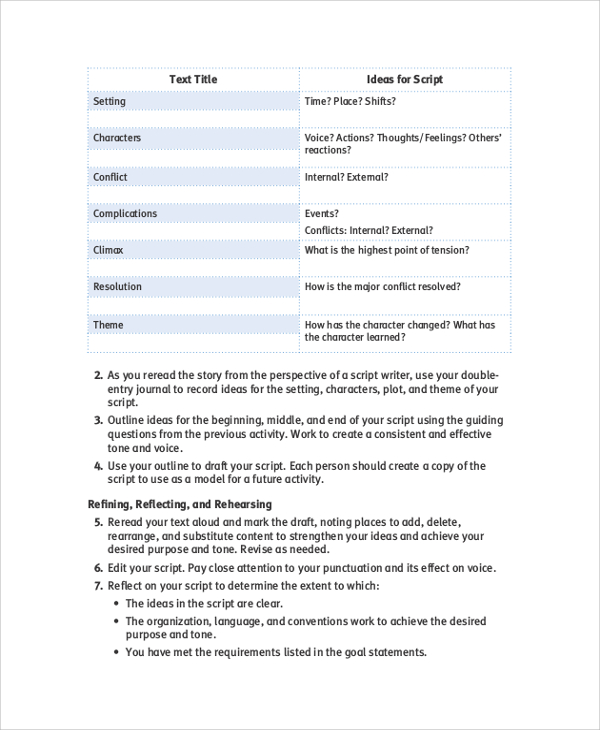
Details
File Format
Size: 888 KB
DownloadA class-constructed script is the one where you need to write a creative script based on certain guidelines and goal statement. It is one of the most popular forms of script writing these days. The manual provided here teaches you how to handle such situations to define a setting and create the characters as per the need. It explains how to create conflicts, the style to be followed, how to create a creative plot, and so on. It comes with several examples and you can rate yourself based on the criteria they have specified to improve yourself. You can also see more on Script Storyboard.
How To Write a Script?
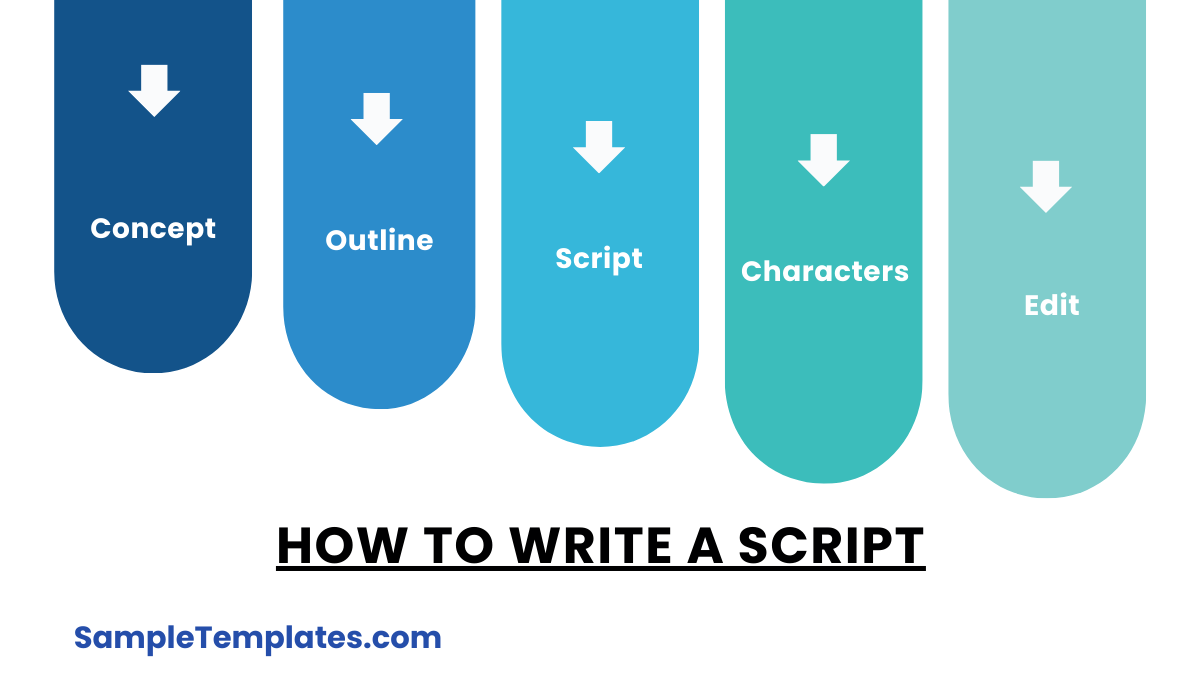
- Develop Your Concept:
- Start with a strong idea or concept. Define the main plot, setting, and key characters. Create a compelling logline that summarizes your story in one or two sentences.
- Create an Outline:
- Organize your story with a detailed outline. Break down the plot into acts, scenes, and sequences. Include major events, turning points, and character development arcs to ensure a coherent structure.
- Write the Script:
- Use proper script formatting. Write scene headings (sluglines), action descriptions, and dialogue. Ensure each element is clear and concise, following industry standards. Focus on visual storytelling and impactful dialogue. You can also see more on Screenplay Sample.
- Develop Characters:
- Create well-rounded characters with distinct voices, motivations, and arcs. Ensure characters evolve throughout the story, facing and overcoming conflicts. Strong character development enhances the emotional depth of your script.
- Revise and Edit:
- Review your script multiple times. Look for plot holes, improve dialogue, and tighten scenes. Seek feedback from peers or mentors and be open to revisions. Polishing your script is crucial for a professional, engaging final product. You can also see more on Script Outline.
Film Script Writing Sample
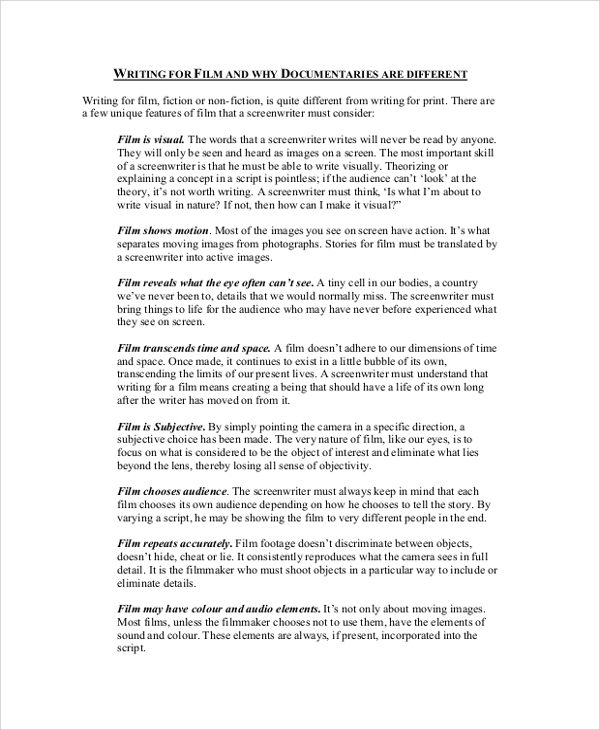
Details
File Format
Size: 474 KB
DownloadThis is a complete manual on how to write a professional film script like the way it is meant to be. It explains the basic things one must know and keep in mind while writing a film script. It concentrates more on writing documentaries. It introduces one to the unique documentary writing styles, how to research in-depth and the questions that one needs to answer before settling down to write. It states the essential script writing element, how to put together all the parts to create a great script and provides multiple formats for writing an awesome script. You can also see more on Beat Sheet.
Broadcast Script Writing Sample
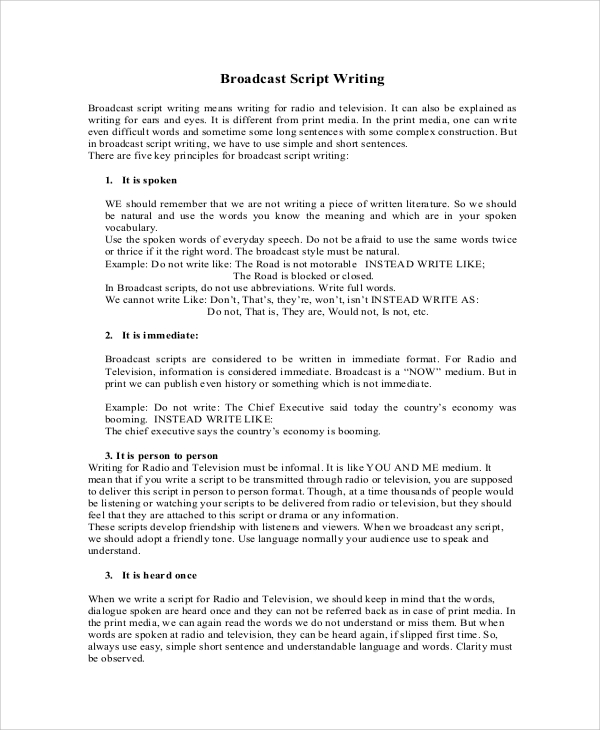
Details
File Format
Size: 70 KB
DownloadUses of Script Writing
- Film Production:
- Scripts are essential for creating movies, providing a detailed blueprint for directors, actors, and production teams to bring stories to life on screen.
- Television Shows:
- Scriptwriting is crucial for TV shows, outlining episodes, dialogue, and scenes to ensure a coherent and engaging series narrative. You can also see more on Article Writing.
- Theater Plays:
- Plays rely on scripts to guide actors and directors in delivering live performances, detailing dialogue, stage directions, and character interactions.
- Advertising:
- Commercial scripts are used to create compelling advertisements, ensuring clear messaging and effective communication within a short time frame.
- Radio Programs:
- Scripts for radio ensure smooth, coherent broadcasts, detailing dialogue, sound effects, and music cues for a seamless audio experience.
- Video Games:
- Scriptwriting in video games involves crafting dialogue, storylines, and character development, enhancing the interactive storytelling experience. You can also see more on Script Storyboard.
- Corporate Training:
- Training videos and presentations often use scripts to ensure consistent, clear communication of educational or instructional content.
- Educational Content:
- Scripts are used for creating educational videos and e-learning materials, providing structured, informative, and engaging content for learners. You may also see Sample Letter Writings
Writing a Video Script Sample
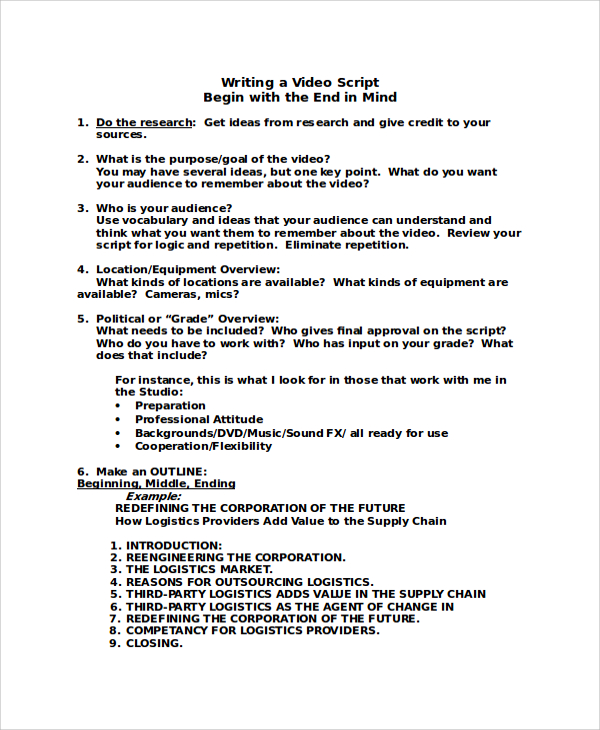
Details
File Format
- DOC
Size: 12 KB
DownloadOriganal Script Writing Sample
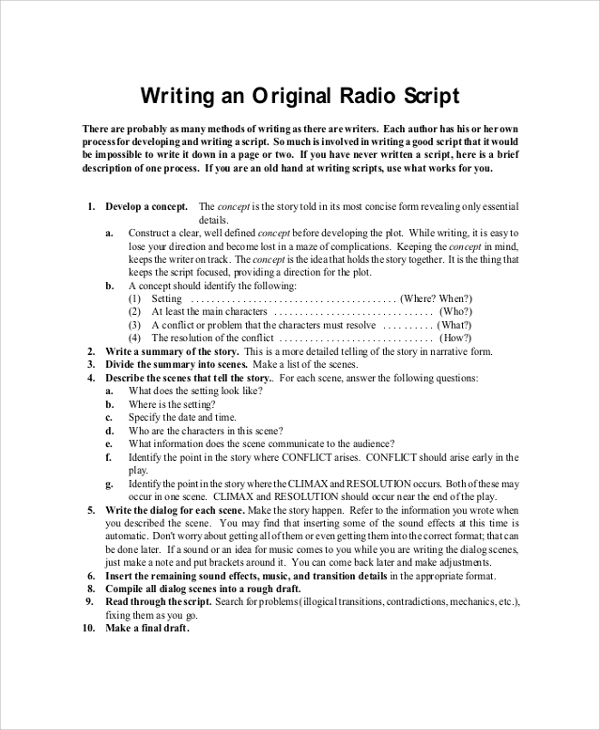
Details
File Format
Size: 38 KB
DownloadBenefits of Script Writing
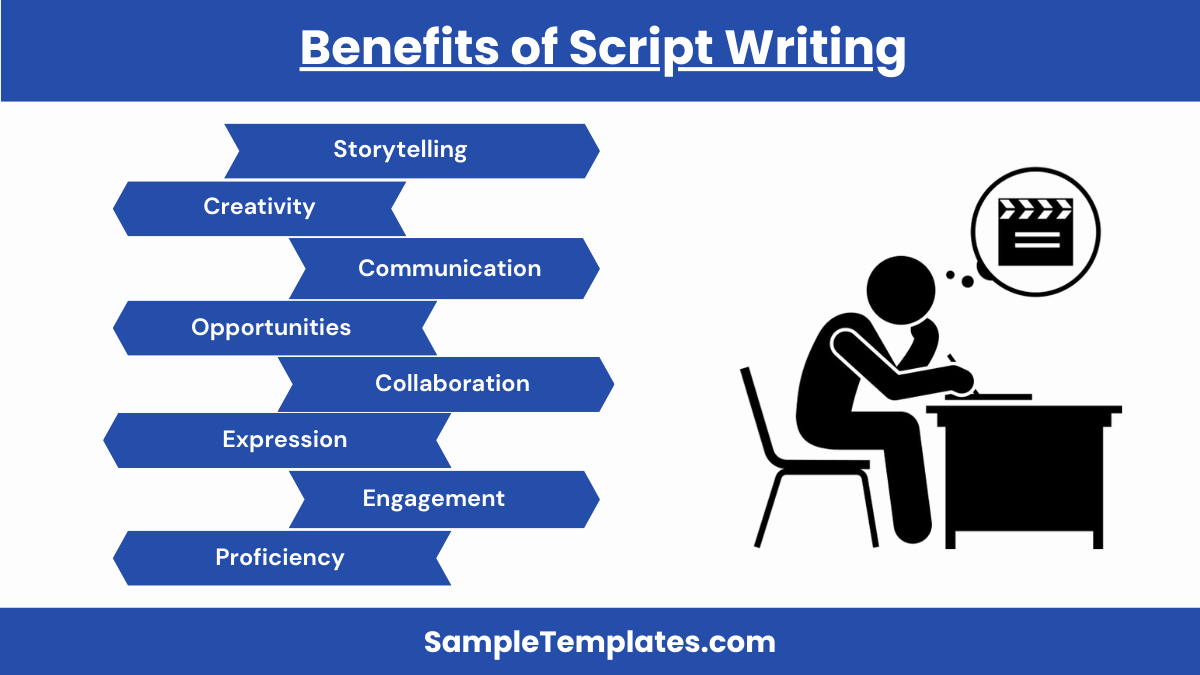
- Structured Storytelling:
- Script writing provides a clear framework for organizing ideas and events, ensuring a coherent and engaging narrative flow.
- Enhanced Creativity:
- The process encourages creativity, allowing writers to explore unique storylines, characters, and dialogues, pushing the boundaries of imagination. You can also see more on One-Page Writing.
- Improved Communication:
- Writing scripts improves communication skills by teaching how to convey ideas clearly and effectively through dialogue and action.
- Professional Opportunities:
- Script writing opens doors to careers in film, television, theater, advertising, and more, offering numerous professional opportunities.
- Collaboration Skills:
- Script writing often involves working with directors, actors, and other writers, enhancing teamwork and collaborative skills. You can also see more on Short Story Outline.
- Problem-Solving:
- Crafting a script requires resolving narrative issues, such as plot holes or character development challenges, which hones problem-solving abilities.
- Emotional Expression:
- Scripts allow writers to express and explore a wide range of emotions, contributing to personal growth and emotional intelligence.
- Audience Engagement:
- A well-written script captivates audiences, creating memorable experiences and fostering a deeper connection between the story and its viewers.
- Technical Proficiency:
- Learning script formatting and industry standards improves technical writing skills, essential for professional scriptwriters.
- Cultural Impact:
- Scripts have the power to influence culture and society, addressing important themes, sparking discussions, and inspiring change. You can also see more on Professional Storyboard.
Screenplay Script Writing Sample
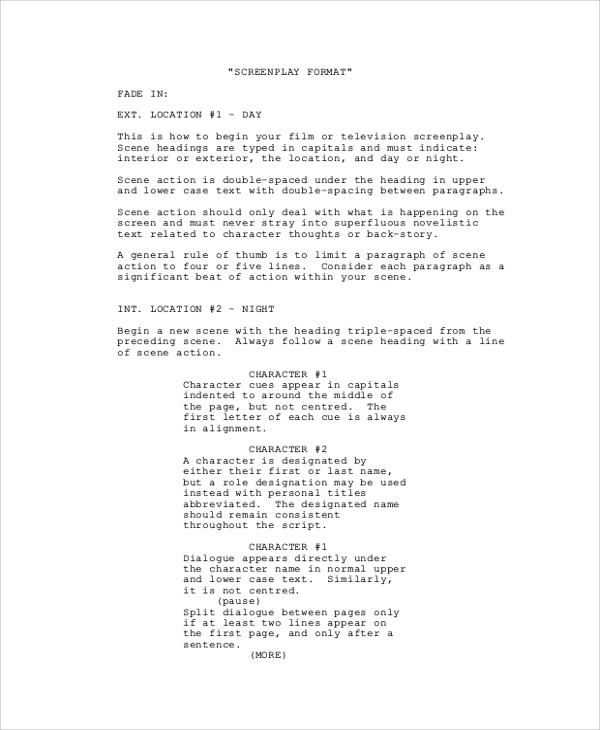
Details
File Format
Size: 33 KB
DownloadSample Documentary Script Writing
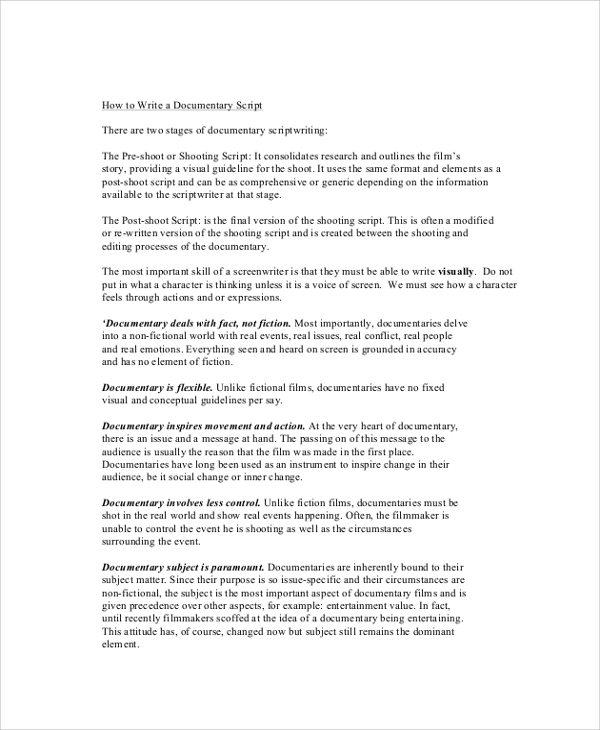
Details
File Format
Size: 125 KB
DownloadTips For Writing a Script
- Start with a Strong Concept:
- Develop a compelling idea or logline that captures the essence of your story. Ensure it has a clear conflict, interesting characters, and a unique angle.
- Create an Outline:
- Plan your script with a detailed outline. Break down the story into acts, sequences, and scenes, highlighting key events and character arcs to maintain a structured narrative.
- Develop Your Characters:
- Craft multi-dimensional characters with distinct personalities, backgrounds, and motivations. Ensure they evolve throughout the story, facing conflicts that drive their development. You can also see more on Short Film Proposal.
- Write Engaging Dialogue:
- Focus on natural, concise, and impactful dialogue that reflects each character’s voice. Avoid unnecessary exposition and ensure conversations reveal character and advance the plot.
- Show, Don’t Tell:
- Use visual storytelling to convey emotions, actions, and plot points. Rely on actions and visuals rather than dialogue to show what’s happening in your story.
- Follow Proper Formatting:
- Use industry-standard script formatting to ensure your script is professional and easy to read. Tools like Final Draft or Celtx can help with this. You can also see more on Commentary Writing.
- Keep Scenes Concise:
- Aim for brevity in your scenes. Each scene should have a clear purpose, advancing the plot or deepening character development, without unnecessary filler.
- Pacing and Rhythm:
- Maintain a good pace by balancing action, dialogue, and exposition. Ensure the story flows smoothly, keeping the audience engaged throughout.
- Revise and Edit:
- Continuously revise your script to improve clarity, coherence, and impact. Seek feedback from peers or mentors and be open to making necessary changes.
- Read Aloud and Workshop:
- Read your script aloud or have others perform a table read. This helps identify awkward dialogue, pacing issues, and other areas for improvement.
- Research and Inspiration:
- Study successful scripts and analyze what makes them effective. Draw inspiration from a variety of sources, but ensure your script maintains its unique voice.
- Stay Persistent:
- Writing a script can be challenging, so stay persistent and disciplined. Set aside regular time for writing and stay committed to completing your script. You can also see more on Video Storyboard.
Story Structure Script Writing
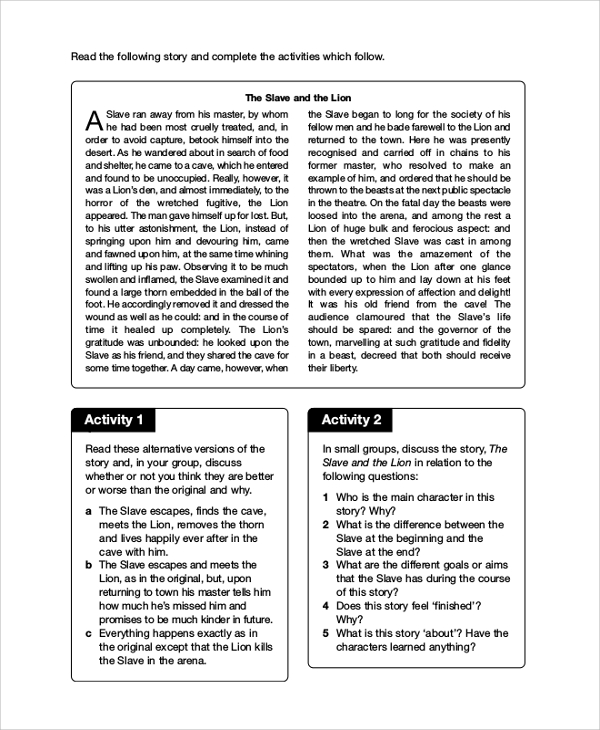
Details
File Format
Size: 520 KB
DownloadTargeted Audience
The targeted audiences for such script writing samples are the amateur script writers and all those people who aspire to be a great script writer one day. They are also useful for producers and directors as with the detailed guidelines, they can turn a simple script into an extraordinary script. They can also set a few goals and guidelines to ask a script writer to prepare a script based on those. You can also see more on Discursive Writing.
Is script writing easy?
Script writing is not easy; it requires creativity, structure, and adherence to industry standards. It involves crafting compelling characters, engaging dialogue, and a coherent plot, demanding both skill and perseverance.
How do I start off a script?
Begin your script with a captivating opening scene that introduces key characters, sets the tone, and hints at the central conflict. Establish the setting and grab the audience’s attention immediately. You can also see more on Abstract Writing.
What font is used for scripts?
Scripts are typically written in 12-point Courier font. This monospaced font ensures uniformity in character spacing, making it the industry standard for readability and formatting.
How do I end a script?
Conclude your script by resolving the central conflict, providing a satisfying conclusion for the characters, and tying up any loose ends. Ensure the ending aligns with the overall theme and message. You can also see more on Comic Storyboard.
What are the rules of writing a script?
Key rules include using proper formatting, developing well-rounded characters, maintaining a clear structure, writing engaging dialogue, showing rather than telling, and adhering to industry standards for readability and professionalism.
Scriptwriting is the art of crafting narratives for film, television, and theater. It requires creativity, structure, and dialogue skills to create compelling stories. Successful scriptwriters blend imagination with industry knowledge to engage audiences and bring characters to life.
If you have any DMCA issues on this post, please contact us!
Related Posts
Weekly Schedule Samples & Templates
Contractual Agreement Samples & Templates
FREE 9+ Amazing Sample Church Bulletin Templates in PSD | PDF
Sample Business Card Templates
Sample Cashier Job Descriptions
Questionnaire Samples
FREE 10+ Sample HR Resource Templates in PDF
FREE 10+ HR Consulting Business Plan Samples in MS Word | Google Docs | Pages | PDF
FREE 49+ Sample Job Descriptions in PDF | MS Word
FREE 16+ Nonprofit Budget Samples in PDF | MS Word | Excel | Google Docs | Google Sheets | Numbers | Pages
FREE 13+ Academic Calendar Templates in Google Docs | MS Word | Pages | PDF
FREE 10+ How to Create an Executive Summary Samples in Google Docs | MS Word | Pages | PDF
FREE 23+ Sample Event Calendar Templates in PDF | MS Word | Google Docs | Apple Pages
Company Profile Samples
FREE 10+ Leadership Report Samples [ Development, Training, Camp ]
